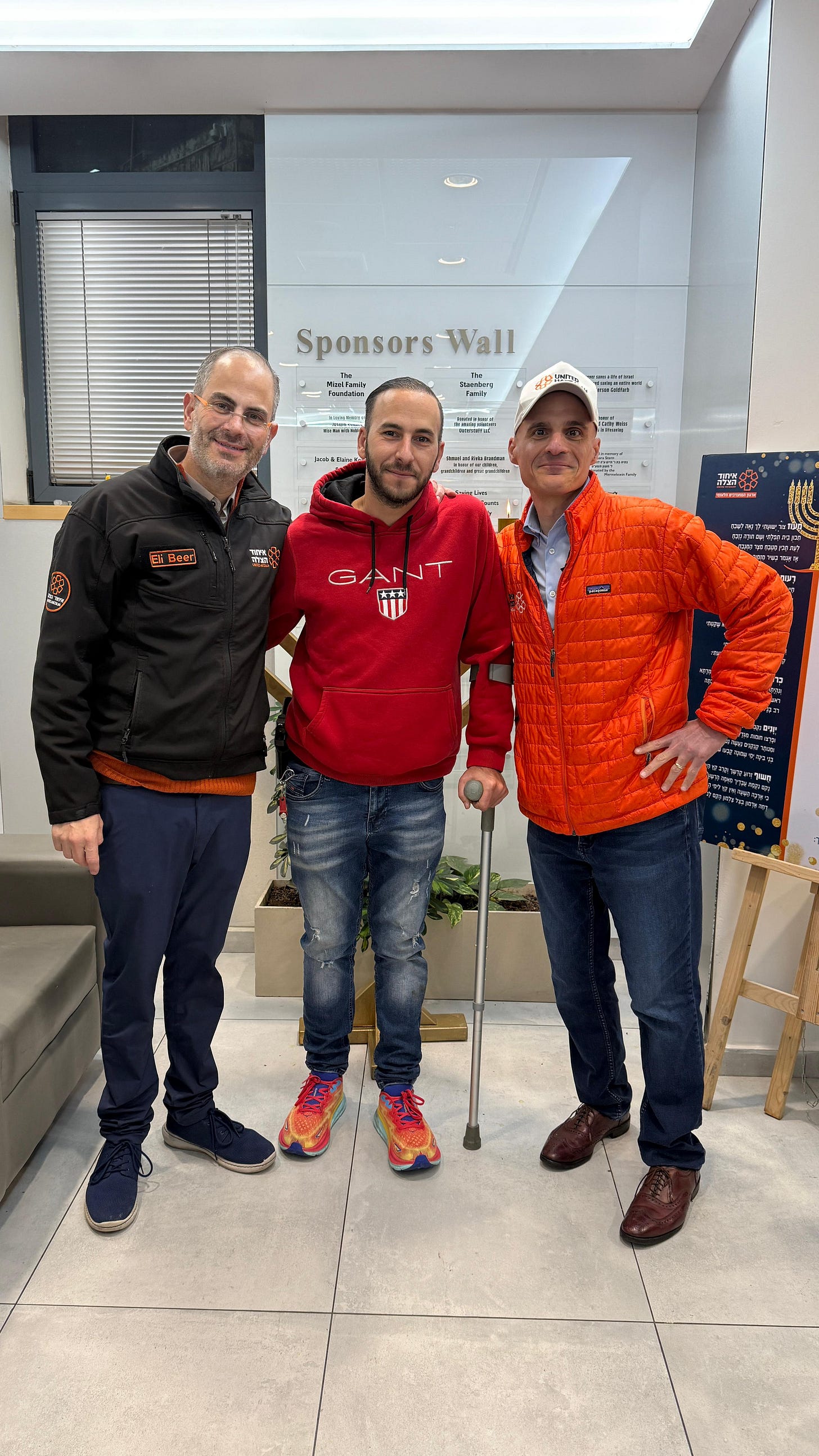The Value of Self-Critique: Reflections on Israel
Our family just returned from a trip to Israel – which was, as are Israel trips, amazing. Erica and I often reflect on how everyone should go to Israel for vacations – and not just for Zionist reasons. Everything that people seek in trips – beaches, history, food, culture, people, hiking, volunteering, music, urban vibrancy, rural calm and desert charm – is in this country which is so small that a traveler can enjoy it all in a week. Moreover, the flights leave at night and return at night – meaning that a visitor can depart the country at midnight and be home by 6am.
We had one of the most Israeli experiences we have had. We started the trip at the Six Senses Shaharut, which was the best resort we have ever stayed at. After a couple of days there, we drove up to Tel Aviv. We saw eight tanks by the side of the road, and the kids (and we) were intrigued. We stopped, and waved to the soldiers. They shouted back to us. We originally thought that they were telling us to stay away, which would have been a reasonable response of a military unit during active training.
But this was Israel. They told us to come to them. Within a couple of minutes – with their encouragement – Aviva was playing on the tank, and a few soldiers were teaching Elijah all about its weaponry. Others were explaining to us about the repairs that they were making on the tank as we spoke.
Erica remembered that we had thank you cards in the car that Aviva and her classmates had made for IDF soldiers. Aviva and Talia handed the cards to the soldiers, who recorded a video for the children who had made them.
(Presenting IDF soldiers with thank you cards from my daughter and her classmates)
The young men – 20/21 years old – told us that they had been in Gaza and Lebanon, and were in advanced officer training. They were looking forward to going home for Shabbat, and returning to protect the country and its people.
Where else, we reflected, could a traveling family walk up to an active military unit – and soon be using a tank as playground equipment, and emerge with new friends?
A few days later, Erica and the kids left for Dubai. I spent the next day with the management of United Hatzalah. Each time I visit the United Hatzalah headquarters, I learn or see something that amazes me. This time, there were a few. United Hatzalah volunteers respond to an average of 2200 emergency calls a day – and, consequently, we have a lot of data. I met with the team that has been recently charged with analyzing the data to make operational improvements. They have developed an AI based prediction system to determine which calls are likely to come from which areas and at what times – and have volunteers do shifts accordingly.
At the menorah lighting that night, Moshe Weitzman, a volunteer, came with his young son to light a candle. He had rushed to the south on October 7 – and stayed for several days. He left only when, in the midst of treating someone, he was hit with shrapnel from an RPG. The doctors were able to save his leg. He recently got out of a wheelchair and is walking with a cane – and is, he said, steadily improving and looking forward to getting back on an ambucycle.
(Together with UH founder Eli Beer and Israeli hero Moshe Weitzman who rushed to the South on October 7 where he was injured saving lives)
Eli Beer and I went to a dinner that night in Abu Ghosh, where primarily Arab volunteers gather on a quarterly basis. It was an evening of Arabic song, dancing, and testimonials of life-saving calls (with Arabic-Hebrew-English translation). We handed out defibrillators, epipens, and vests.
I had lunch the next day at a terrific Tel Aviv beachside restaurant (La Mer) with my friend and fellow 3I Member Ariella Raviv, who grew up in Michigan and made aliyah. Ariella and I reflected on what Israelis often say about themselves.
Israelis, they say of themselves, are terrible drivers. They are hard to do business with. The service at restaurants and hotels is bad. El Al is a national embarrassment – so much so that an Israeli comedian I met at a United Hatzalah event in Miami joked that it is a justifiable cause of antisemitism. The political system is corrupt. The society is fractured around many lines – haredi/secular, left/right (particularly with judicial reform in 2023) among others.
Is this, Ariella and I wondered, true?
The World Health Organization has the data on traffic fatalities – which is a proxy for accidents and driver safety. The WHO data says that Israel has one of the world’s lowest rates of traffic fatalities. Syria has 29.9 traffic deaths/100,000 people, Iran has 20.6, the United States has 14.2, New Zealand has 6.6, Canada and France have 4.7, Estonia has 4.4 and Israel has 4.2.
Israeli drivers are not the best in the world – there are fewer traffic fatalities in China, Monaco, Singapore, Japan, Germany and a few other countries. But it is certainly correct to say that Israelis are good drivers, and that Israeli roads are safe.
Are Israelis hard to do business with? I have invested in Israel for fifteen or so years – and have found Israeli entrepreneurs and venture capitalists to be straightforward, disciplined and solicitous of counsel and contacts – reflecting an awareness of what they know and what they don’t. Of course, my experience is limited. But I saw my friend Eric Reiner, one of the best venture capitalists of his generation (early 30s), at a wedding. Eric told me that his firm (Vine Ventures) is doing much of its investing now in Israel.
When I asked him why, he said that Israeli entrepreneurs are creative, resourceful, unfazed by inevitable setbacks and disappointments and eager to receive and implement good ideas from everywhere. Eric and another remarkable young investor I met at the wedding (Max August) told me of all the firms that are either coming to Israel or significantly increasing their presence there – many of whom are well-regarded in the entrepreneurial space. If Israelis were hard to work with, I doubt that the world’s best investment firms would be deploying so much capital there – and planning to deploy even more.
As for El Al? I’ve been on two flights recently with other airlines where the WiFi was down for no reason – that has never happened to me on probably a hundred flights on El Al. In fact, I have had nothing but great experiences on El Al. One flight got delayed a few hours once, but they called and texted – which gave me (and my sons, who I was with) the opportunity to spend a memorable night walking the streets of central Jerusalem after Shabbat. I don’t even know what the criticism of El Al is about. It’s just strange.
Israelis are also quick to say that their politics are corrupt. This charge has deep resonance in the Jewish state, as the biblical Abraham refused “even a shoestring” after a military victory and Moses made clear that, “I have not taken a single donkey” in response to Korach’s rebellion against him – implying that using a public position for any private gain would invalidate the legitimacy of the leader.
Is Israel corrupt? The fact that citizens freely and frequently accuse their leaders of corruption is not indicative of corruption. It might signify the opposite, as it indicates that a citizenry is vigilant and intolerant about it. Indeed, a quick Google search reveals that corruption is an issue in even famously non-corrupt countries like Denmark and Sweden. The test is not whether citizens and journalists accuse leaders of corruption – but what is considered corruption, and how vigilantly corruption is prosecuted. Israeli Prime Minister Bibi Netanyahu is presently on trial – yes, on trial during a war – for accepting too many cigars from a friend (who did not want anything from the government) and for cutting a deal with a media company in return for favorable coverage (the company’s coverage remained largely negative about him).
The most frequent charge that Israelis level against themselves and their country — certainly before October 7, where this charge reached a fever pitch – is that their society is deeply fractured. It is, they say, fractured along political lines (particularly around judicial reform) and religious lines (particularly around the Haredim). These fractures, they often say, threaten the stability of the state – as evidenced by reservists from several key units in the summer of 2023 (during the dispute over judicial reform) saying that they would not show up for service.
But how fractured is Israeli society really? Ariella told me that if she takes her child outside in 70 degree weather, she is liable to have lots of people tell her that she should really have her child wear a jacket. Another Israeli friend told me that he routinely tells kids who are roughhousing or otherwise misbehaving on a bus to conduct themselves differently. He said that he does this in line with cultural norms and expectations – and never would do it in Canada and Australia, where he grew up.
What kind of person would tell a stranger to make sure that her daughter should be wearing a jacket or a kid on a bus to sit with his legs straight in front of himself? In any other society, a parent, a grandparent or maybe a very close friend. In Israel, people do so with strangers for the same reason: because they really care about the person or parent they are advising (or chastising).
But those are anecdotes. Let’s go to the data. After October 7, more than 100% of reservists showed up for duty – with some units having 150% of reservists show up (meaning that reservists who aged out or otherwise retired demanded to serve). There’s an even more interesting data source – the annual World Happiness Report, produced by Oxford, Gallup and the United Nations. In 2024 – that is, in the middle of a multi-front war– Israel ranked #5 in happiness, behind only Finland, Denmark, Iceland and Sweden. And that’s not all. Among both young and lower middle age people Israel ranked #2 (among the young, only Lithuanians are happier; among the lower middle age, only the Finns are happier).
Given the achievements and beauty of Israel and its people, why would Israelis be so self-critical? Because it is the Jewish state, and our great guidebook is the Torah. In Genesis 32, Jacob – about to confront his brother Esau, from whose wrath he fled 22 years ago – prays to God. He says: “I have been diminished by all the kindnesses and by all the truth that You have done Your servant.” Jacob is articulating the idea that success should not be cause to feel arrogant, but to feel humbled. In Exodus 3, God anoints Moses as the man who will free the Jews from Egyptian slavery and lead us into the Promised Land. Moses pleads his inadequacy. This humility enables the continual self-improvement which is an imperative in the Torah and subsequent Jewish thought.
(‘The Prayer of Jacob’ by Gustave Doré, 1832-1883)
And it is not just the biblical stories. In Leviticus 19:17, the Torah instructs: “Rebuke, rebuke your fellow.” The strangers who tell Ariella to put a jacket on her child are, whether they know it or not, living this Torah verse. Still, a question on this verse remains. Why does it say “rebuke” twice? The Chassidic Masters said that it is not redundant – but a dual commandment. One must first rebuke himself before he can hope to rebuke his fellow to improve him.
This is what Israelis are doing all the time – from their airlines to their society – showing that, even secular Israelis who do not study the Bible much are living in a very Jewish state whose norms, expectations and values are based in the Torah.





…I’ve toured Israel twice, for short visits with eagles wings and bishop Robert… this article you’ve written makes me so aware that a “tour” will never be enough to truly know the holy land and its people … I’m excited for the next opportunity to go …. maybe less touring and more time to explore and learn … thank you for sharing @God Was Right… (Mark Gerson)
This was a great read, thanks for bringing us along,.